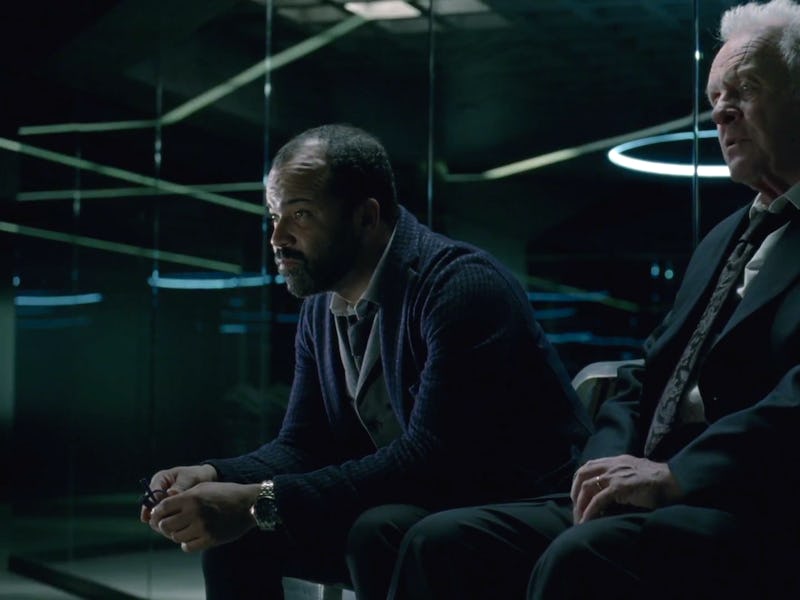Bernard Is a Host, So What's His Purpose on 'Westworld' Now?
He'll either remain a subservient robot or become an artificially intelligent leader.

The opening to the eighth episode of Westworld, “Trace Decay” is tough to watch. Bernard, who has finally been revealed to be a robot, is hysterical. He’s in denial about what he has just done, but he has no control. Dr. Robert Ford, the park’s founder and his creator, knew everything about Theresa’s plot to help the board oust him and take the park’s intellectual property, and so he ordered Bernard to murder Theresa in the secret basement lair of his little Sector 17 cabin. “I’m a killer. My god, my god,” Bernard says through tears to Ford. “God has nothing to do with it,” Ford responds. “You killed her because I told you to.”
Ford fashions himself as the park’s own god, and this isn’t the first time his words say as much. But Bernard’s reactions to his command reveals an icy truth that will inevitably play out in the show’s final two episodes.
“You should be proud of these emotions you’re feeling,” Ford plainly tells Bernard. “After all, you yourself are the author of so many of them.” Bernard isn’t the first host to become self-aware (that’d be Maeve), or even the first to recognize past memories in reveries (first Dolores and now Teddy). But this moment stings the most for Bernard because he realizes he is now squarely one of the main pawns in Ford’s game and, unlike Maeve, isn’t in a position to do anything about it yet.
In a later conversation, Bernard’s tragic internal monologue becomes external. “I understand what I’m made of, how I’m coded, but I do not understand the things that I feel. Are they real, the things I experienced? My wife? The loss of my son?” he asks, causing Ford to explain that which seemingly makes us most human makes us anything but.
“We can’t define consciousness, because consciousness does not exist,” Ford says. “Humans fancy that there’s something special about the way we perceive the world, and yet we live in loops as tight and as closed as the hosts do, seldom questioning our choices, content, for the most part, to be told what to do next.”
Ford’s dialogue isn’t as big a twist as Bernard being a robot, but it’s a revelation about the human characters in the show who have been difficult to empathize with throughout the first season. Bernard and the hosts are machines programmed to feel. They love, they hate, they emote, but only because they are stuck in an endless loop of those predetermined feelings. It’s easy for us to sympathize with these sort of hopeless minions because we pity them. People like Ford obviously don’t feel the same way. In fact, he’s almost jealous, as he indicates in “The Stray,” when talking about a host that was covered up by a technician: “It doesn’t get cold, doesn’t feel ashamed, doesn’t feel a solitary thing that we haven’t told it to,” he says.
In case you didn’t get this from Ford’s robo-hit on Theresa, he and the humans on the show are cold, unemotional, and detached from the very feelings that they’re supposedly giving to the robots they’ve created. Robots like Bernard, in their pain and suffering, are more human than the humans. Just because you have a soul doesn’t mean you’re not soulless.
Ford ultimately commands Bernard to meticulously clean up the Theresa mess, staging it as an accident, before totally erasing his memory of Theresa altogether with a guarantee that this is the only time he’s ever done such a thing. But we can’t really trust Ford anymore, can we? Only Stubbs, the head of security, recognizes that something is up when he tries to console Bernard, Theresa’s former lover. This memory erasure gives the episode its title, a reference to the psychological concept that short-term memories leave a chemical trace (or in Bernard’s case, a digital trace) before they’re forgotten.
Trace decay is unnatural to a host like Bernard simply because his memories, like those of his dead son or Theresa, can only be programmed to be forgotten. And yet the park’s hosts are recalling the trace memories that have been programmed out of their digital minds. The Bicameral Mind concept, introduced into the hosts by Arnold — the yang to Ford’s yin — is making a comeback in a way that won’t drive the hosts digitally insane like the poor Woodcutter. Instead, Bernard’s position close enough to Ford could challenge his maker’s assumption about the extent of his creation’s artificial intelligence.
Whether one is man or machine doesn’t matter anymore. The impending conflict that will round out Season 1 will be about who remembers what, and what they can do with those memories. As Ford readily admits to Bernard, “You are in a unique position: a programmer who knows intimately how the machines work and a machine who knows its own true nature.” He’s in a unique position, indeed, and he might even be in an equal position to Ford.